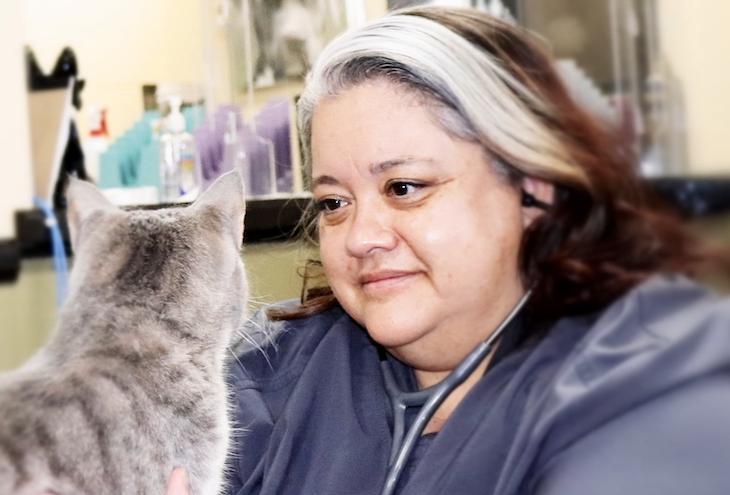For Dr. Christina Swindall, Gabrieleño, becoming a veterinarian was a childhood dream. She grew up in the Los Angeles area the ancestral homeland of her tribe — spending much of her time assisting her mother, who had been blind from the age of 14. In their home the health of family pets was not a priority — the animals weren’t spayed or neutered and didn’t see the vet when they were sick. Dr. Swindall knew that she wanted better outcomes for animals and focused her energy on becoming a vet.
She started undergrad at an affordable community college, then transferred to Boise State University and later earned a BS in biology. But when she applied to veterinary school, she didn’t get in. She moved back to LA, where she waited tables to support herself and applied again the following year, without success. She then applied to Colorado State University and was accepted as an out-of-state student. The tuition was too high for her to afford, so she moved to Colorado, living there for a year so she could benefit from the in-state tuition rate, and reapplied. This time she had the success she needed to pursue her dream.
After she graduated from veterinary school in 2002, Dr. Swindall and her husband moved back to LA, where she got a job at a busy animal hospital — the practice had nine doctors on staff and served a large number of animals. As a new graduate, Dr. Swindall found support and mentorship there that helped her quickly expand her skills.
But after a few years, she needed a change from the fast pace and high patient volume. “It got to where I couldn’t remember pets that had come in the day before,” she says. She made the move to Cypress Animal Hospital, a smaller practice with a family-centered pace that matches her style. Here she’s found the focus on more intimate care for patients rewarding. “I’ve worked with clients and their pets through the pet's whole lifetime now,” Dr. Swindall says, “from their first visit at eight weeks old through old age.”
In 2008 when the practice owner retired, Dr. Swindall bought the clinic together with the hospital administrator. “Now, not only am I my own boss,” she says, “but I have an asset that can help me in retirement.”
The business has grown to 14 employees. “This work is what I’ve always wanted to do,” she says. “I like the variety — each day is different.” On many of those days she has continual appointments ranging from wellness exams to vaccinations for newly adopted puppies. And then there are urgent-care cases. “When a pet is sick or injured, we often don’t know until the day of because our pets can't tell us they're feeling sick. Clients often don't know until the symptoms are more obvious,” she explains.
On some mornings she performs surgery — anything from neutering and spaying to dentals or tumor removals. “I love dental work in particular,” she says. “I’ve seen so many pets whose dental health has been neglected, and I’ve had to extract so many teeth. But it’s rewarding to see those pets feeling better within a couple days.” She’s also gratified to see thankful clients.
Dr. Swindall volunteers for her two sons’ Boy Scout troop and for her tribe, where she’s served as secretary for a decade. In addition to administrative duties, she has built a children’s council, created materials for teaching tribal history, and co-authored Toypurina: The Joan of Arc of California, a book about a heroine of the Gabrieleño people.
Teaching has been an increasing focus. “You don’t know what you’ll find while pursuing your goal,” she says. “The heroine of my book rose up to fight the mission system because she could no longer witness the oppression of her people.” Recently Dr. Swindall was picked to help build a course curriculum for her son’s high school under a new California law requiring all high schools to offer a one-semester course in ethnic studies. The course she’s helping to design covers challenges and prejudices that still exist, with a goal of building passion and respect in future students.
Dr. Swindall knows that education is just one vital element in perpetuating her tribe. “Finding STEM and other professionals to meet our tribe’s needs is another important task — archeologists and anthropologists, for example, are needed if we’re going to preserve our culture going forward,” she says. “Rebuilding our culture is a lifelong project, a vital commitment to keep our culture alive in our future … in our youth."













